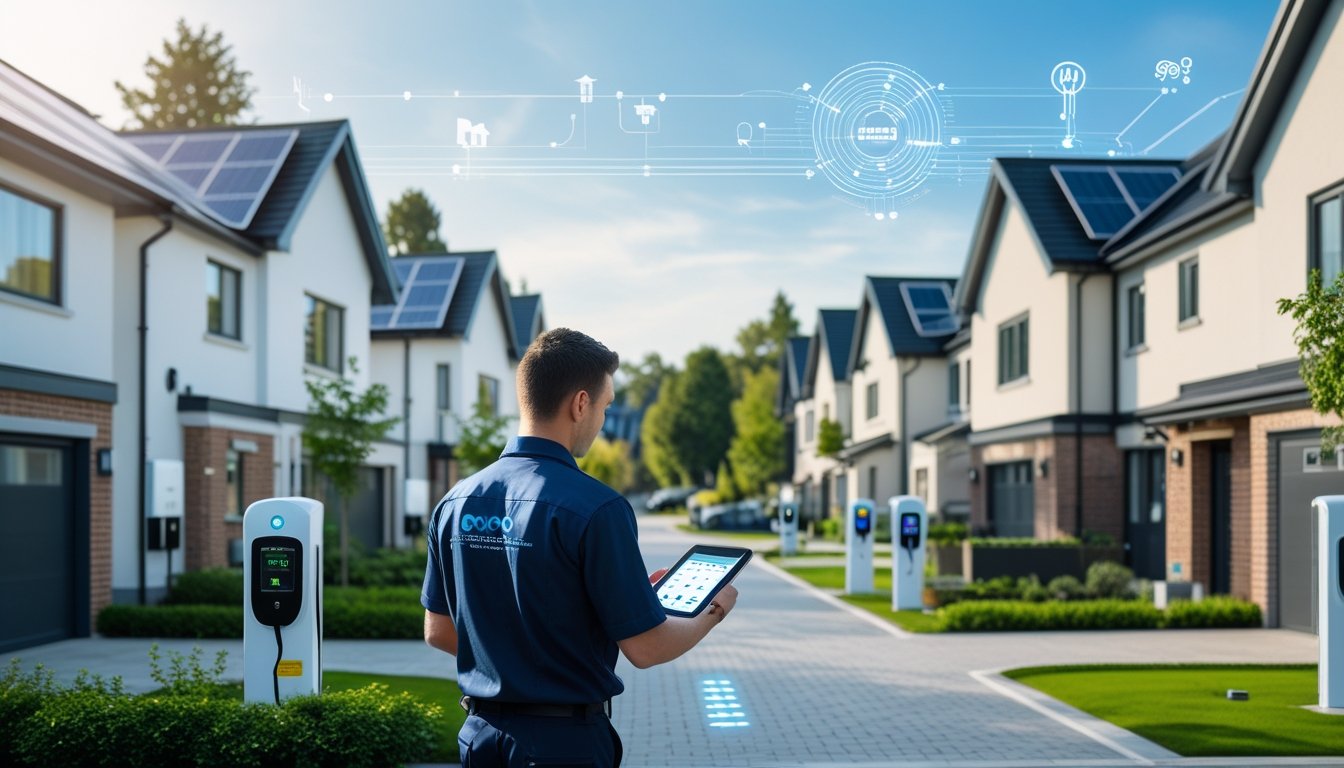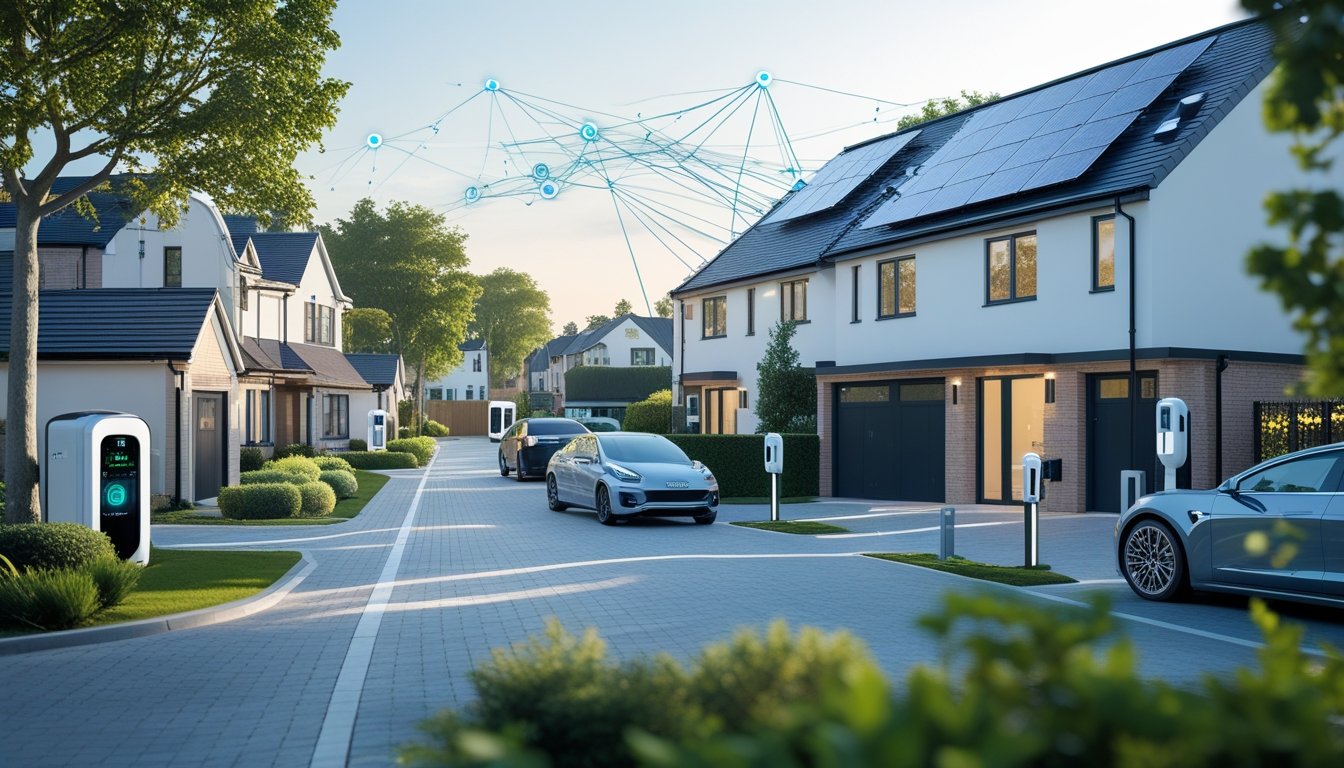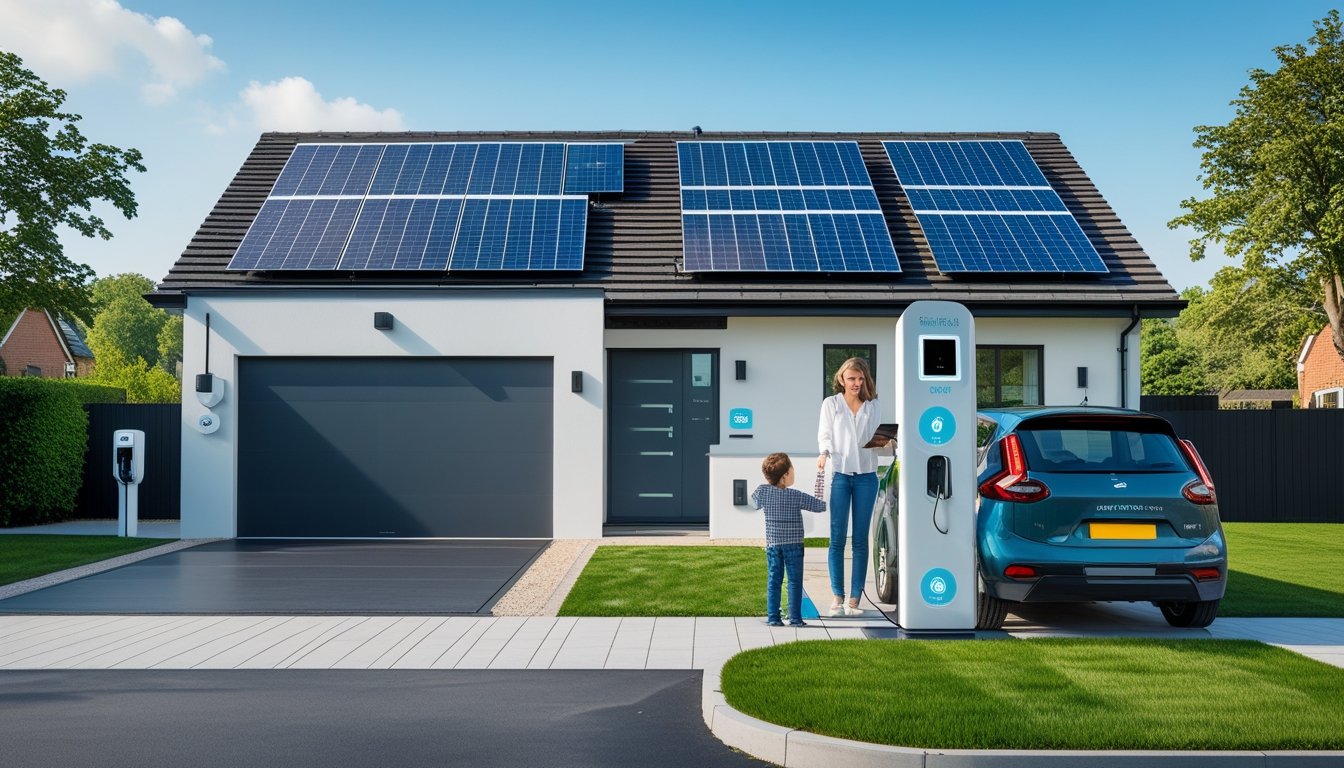Late updated: 12 Jul 2025 12:07
Written by: Eleanor Hartman
Innovative Smart Grid Solutions For UK Homes: Enhancing Energy Efficiency
Smart grid technology is transforming the way we power our homes in the United Kingdom. This innovative approach integrates advanced home technology with the evolving energy infrastructure to optimise electricity distribution and enhance sustainability. Smart grids present an exciting opportunity to reduce costs and achieve efficient energy use through intelligent systems and renewable sources. By integrating state-of-the-art technology such as AI and data analytics, smart grids balance energy loads and provide reliable and sustainable power to homes across the UK.

As we navigate through the climate challenges of our time, the focus on energy efficiency, renewable sources, and smart solutions continues to grow. The deployment of smart grids across the nation not only supports our sustainability goals but also encourages a greener lifestyle by reducing energy consumption and reliance on fossil fuels. From smart meters to AI-driven platforms, these innovations are streamlining the way we consume energy while promoting responsible usage and cost savings.
The potential of smart grid solutions goes beyond just technological advancements; it taps into a larger goal of creating a self-sustaining and eco-friendly environment. As leaders in smart grid development, we are committed to sharing insights into how these systems are revolutionising energy use in UK homes, setting us on a path towards a sustainable future.
Key Takeaways
- Smart grids enhance energy efficiency and sustainability.
- Advanced technology like AI optimises energy distribution.
- Smart grids foster cost savings and eco-friendly living.
Key Innovations in Smart Grid Solutions for UK Homes
Our exploration of innovative smart grid solutions for UK homes highlights essential advancements in the field. The focus is on smart meters, the integration of renewable energy, innovative energy storage, and efficient home energy management systems.
Smart Meters and Advanced Metering Infrastructure
Smart meters form the backbone of modern smart grid systems, giving us precise, real-time data on electricity consumption. Unlike traditional meters, they enable bidirectional communication between utilities and consumers, allowing for efficient consumption tracking and dynamic pricing. This real-time capability empowers us to adjust our usage patterns and contribute to load balancing.
Advanced metering infrastructure (AMI) enhances these capabilities further. It incorporates not only smart meters but also communication networks and data management systems. This enables detailed monitoring, helping utilities identify theft and losses, as well as optimise grid management.
Integration of Renewable Energy Systems
In incorporating renewable energy sources like solar PV and wind power, our smart grids become more sustainable and resilient. This shift is crucial given the UK's commitment to reducing fossil fuel dependency by 2030. Homes with integrated renewable systems can generate and consume clean energy, further supported by decentralised energy solutions such as microgrids.
Microgrids encourage local energy generation and distribution, improving efficiency and reliability. By being less dependent on central power stations, they reduce energy loss across transmission lines and enhance grid security. Our emphasis on renewable power integration thus supports both environmental and economic objectives.
Innovative Energy Storage Solutions
Energy storage systems are a pivotal component of smart grids, addressing the intermittent nature of renewable sources. By using battery storage solutions, we can harness surplus energy generated during peak production times, storing it for future utilisation when demand is high or generation is low.
Advanced energy storage options, such as lithium-ion and flow batteries, provide versatile applications for homes integrated into smart grids. This flexibility is crucial for energy independence and security. Systems equipped with these solutions not only aid in balancing supply and demand but also enhance the resilience of our energy infrastructure.
Home Energy Management Systems
Home energy management systems (HEMS) allow us to better control and optimise our energy use. By using smart devices connected through IoT technology, we can effectively manage our consumption, identify wasteful patterns, and automate settings to save energy and reduce costs.
These systems facilitate seamless integration with renewable energy setups and energy storage, ensuring a balanced energy ecosystem. HEMS also support demand response mechanisms, encouraging us to adjust our electricity usage during peak periods and contributing to overall grid stability. This proactive approach empowers us as consumers, making energy savings and efficiency more achievable.
Smart Grid Technology Advancing Sustainability and Efficiency

Smart grid technology plays a crucial role in enhancing the sustainability and efficiency of energy systems. These advanced grids help reduce carbon emissions and improve energy distribution, aligning with the UK’s net zero targets. They also facilitate flexible energy usage and optimise power networks for reliable delivery.
Demand Response and Flexible Energy Consumption
Demand response is a transformative aspect of smart grids. It allows us to adjust energy consumption based on supply conditions, which is essential for balancing the electricity grid during peak times. By responding to demand signals, users can shift or reduce energy use when electricity is scarce or costly.
This shift enhances energy conservation efforts and can lower energy bills for households. It supports the integration of renewable resources like wind and solar. Ofgem's initiatives further encourage innovations that help customers actively manage their energy consumption, thus contributing to a more sustainable energy system.
Optimising Energy Distribution and Grid Reliability
Optimising energy distribution is fundamental to ensuring grid reliability and efficiency. Smart grid technology uses real-time monitoring and automated systems to anticipate and resolve distribution issues quickly. This capability helps avoid blackouts and reduces energy waste.
Our electricity networks become more adaptable through decentralised energy resources like heat pumps and EV charging stations. Intelligent systems analyse data to optimise delivery routes. This not only improves grid reliability but also reduces operational costs. The shift towards a more robust energy infrastructure supports our transition to low-carbon solutions.
Improving Energy Efficiency and Reducing Energy Bills
Improving energy efficiency is a vital benefit of smart grid systems. Smart technology enables us to monitor and manage energy use effectively, leading to reduced consumption and savings on energy bills. Devices like smart meters help households track usage patterns and identify areas for improvement.
Smart grids facilitate the integration of green energy sources, promoting decarbonisation and helping the UK achieve its net zero targets. They empower us to optimise energy use, which is paramount in both residential settings and broader smart city developments. These efficiencies not only benefit the environment by lowering carbon emissions but also provide financial savings for consumers.
Frequently Asked Questions

Smart grid solutions are pivotal in revolutionising energy management for UK homes. Through advanced technology and integration of renewable energy sources, smart grids enhance efficiency, reliability, and sustainability, while also offering homeowners innovative ways to manage their energy consumption.
How can smart grids contribute to energy savings in residential areas?
Smart grids enhance energy savings through real-time data analytics and advanced technology. By optimising energy distribution and reducing wastage, they minimise costs. Smart metering systems, in particular, provide precise readings that encourage informed energy use, ultimately lowering household electricity bills.
What are the primary benefits of integrating renewable energy sources into smart grids for households?
Integrating renewable energy sources into smart grids facilitates a shift towards sustainable living. Households can benefit from cheaper energy bills, improved reliability, and reduced carbon footprints. Moreover, smart grids enable efficient incorporation of solar panels and wind turbines, supporting the transition to a low-carbon economy.
In what ways can homeowners monitor and manage their energy consumption with smart grid technologies?
With smart grid technologies, homeowners have access to real-time consumption data, which can be viewed through online portals or apps. These tools empower residents to adjust energy use, schedule appliance operation during off-peak hours, and benefit from cost-saving opportunities, enhancing control over their energy expenses.
What incentives are available for UK homeowners to upgrade to smart grid systems?
UK homeowners can access various incentives, such as grants and tax relief schemes, to facilitate the transition to smart grid systems. These financial incentives not only offset initial costs but also encourage wider adoption of sustainable energy practices, promoting environmental responsibility and economic savings.
How does demand-side response (DSR) work within a smart grid framework for home energy management?
Demand-side response (DSR) is a mechanism that encourages users to adjust their energy usage during peak times. It helps balance the grid by offering incentives for reduced consumption. Smart grids use automated systems to efficiently manage demand, ensuring a stable and cost-effective energy supply.
What security measures are in place to protect the data and privacy of consumers using smart grid systems?
Smart grid systems incorporate advanced cybersecurity measures to safeguard consumer data and privacy. Encryption protocols, secure data transmission channels, and strict access controls are employed to prevent unauthorised access and ensure the integrity of sensitive information, maintaining consumer trust in smart grid technology.